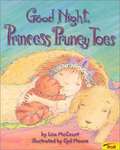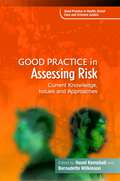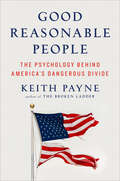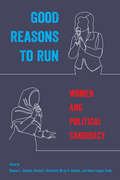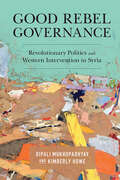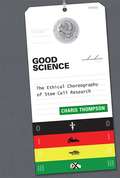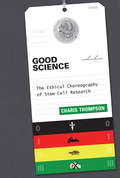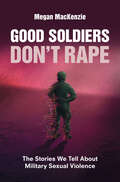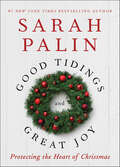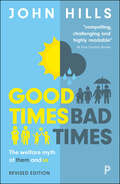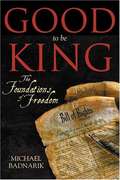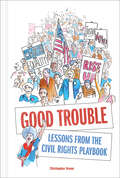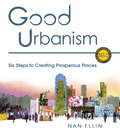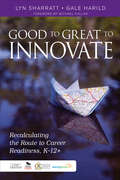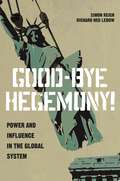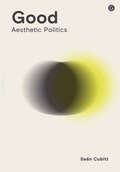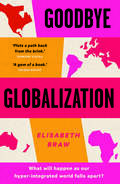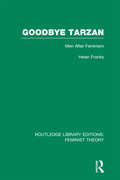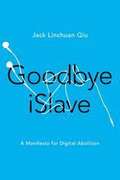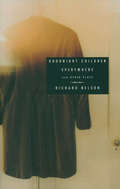- Table View
- List View
Good Night, Princess Pruney Toes
by Lisa MccourtA little girl gets ready for bed with her father. She takes a bath, gets dressed for bed, has a snack, brushes her teeth, does a dance, and gets tucked in, all while pretending to be a princess.
Good Practice in Assessing Risk
by Bernadette Wilkinson Edited by Hazel KemshallMaintaining a balance between managing and assessing risk and upholding the required high standards of practice in health and social care can be demanding, particularly in the current climate of increased preoccupation with the difficult tensions between rights, protection and risk-taking. Good Practice in Assessing Risk is a comprehensive guide to good practice for those working with risk, covering a wide variety of health, social care and criminal justice settings including child protection, mental health, work with sex offenders and work with victims of domestic violence. The contributors discuss a range of key issues relating to risk including positive risk-taking, collaborating with victims and practitioners in the design of assessment tools, resilience to risk, and defensibility. The book also explores the role of bureaucracy in hindering high quality professional practice, complex decision-making in situations of stress or potential blame, and involving service users in assessment. This book reflects the latest policy and practice within health, social care and criminal justice and will be an invaluable volume to all professionals working in these fields.
Good Reasonable People: The Psychology Behind America's Dangerous Divide
by Keith PayneA Behavioral Scientist Notable Book of 2024&“An eye-opening analysis of why our politics have become so polarized….Keith Payne illuminates one of the biggest problems of our time and lights the way toward some promising solutions.&” —Adam Grant, #1 New York Times bestselling author of Think Again "Good Reasonable People challenges each of us to drop the weapon of demonization and replace it with something more powerful: a framework for understanding—and for being understood by—people who see the world differently from us." —Margot Lee Shetterly, #1 New York Times bestselling author of Hidden FiguresA leading social scientist explains the psychology of our current social divide and how understanding it can help reduce the conflicts it causesThere has been much written about the impact of polarization on elections, political parties, and policy outcomes. But Keith Payne&’s goal is more personal: to focus on what our divisions mean for us as individuals, as families, and as communities. This book is about how ordinary people think about politics, why talking about it is so hard, and how we can begin to mend the personal bonds that are fraying for so many of us.Drawing upon his own research and his experience growing up in a working class, conservative Christian family in small town Kentucky, Payne argues that there is a near-universal human tendency to believe that people who are different from us are irrational or foolish. The fundamental source of our division is our need to flexibly rationalize ideas in order to see ourselves as good people. Understanding the psychology behind our political divide provides clues about how we can reduce the damage it is causing. It won&’t allow us to undo our polarization overnight, but it can give us the tools to stop going around in circles in frustrating arguments. It can help us make better choices about how we engage in political debates, how policy makers and social media companies deal with misinformation, and how we deal with each other on social media. It can help us separate, if we choose to, our political principles from our personal relationships so that we can nurture both.
Good Reasons to Run: Women and Political Candidacy
by Dawn Langan Teele Shauna L. Shames Rachel I. Bernhard Mirya R. HolmanAfter the 2016 U.S. Presidential election, a large cohort of women emerged to run for office. Their efforts changed the landscape of candidates and representation. However, women are still far less likely than men to seek elective office, and face biases and obstacles in campaigns. (Women running for Congress make twice as many phone calls as men to raise the same contributions.) The editors and contributors to Good Reasons to Run, a mix of scholars and practitioners, examine the reasons why women run—and do not run—for political office. They focus on the opportunities, policies, and structures that promote women’s candidacies. How do nonprofits help recruit and finance women as candidates? And what role does money play in women’s campaigns? The essays in Good Reasons to Run ask not just who wants to run, but how to activate and encourage such ambition among a larger population of potential female candidates while also increasing the diversity of women running for office.
Good Rebel Governance: Revolutionary Politics and Western Intervention in Syria
by Dipali Mukhopadhyay Kimberly HoweWhen a revolutionary uprising erupted in Syria during the spring of 2011, pockets of local resistance and the nascent institutions therein transformed into clusters of rudimentary participatory politics and service delivery. Despite the collective fatigue induced by the wars in Afghanistan and Iraq, the United States and its allies embarked on an effort to encourage liberal, democratic politics amid the Syrian conflict. As a result, the project of 'good rebel governance' became the latest attempt at Western democracy promotion. This book moves the scholarship on insurgent rule forward by considering how governing authority arises and evolves during violent conflict, and whether particular institutions of insurgent rule can be cultivated through foreign intervention. In so doing, the book theorizes not only about the nature of authoritative rebel governance but also tests the long-standing precepts that have undergirded Western promotion of democracy abroad.
Good Science
by Charis ThompsonAfter a decade and a half, human pluripotent stem cell research has been normalized. There may be no consensus on the status of the embryo -- only a tacit agreement to disagree -- but the debate now takes place in a context in which human stem cell research and related technologies already exist. In this book, Charis Thompson investigates the evolution of the controversy over human pluripotent stem cell research in the United States and proposes a new ethical approach for "good science." Thompson traces political, ethical, and scientific developments that came together in what she characterizes as a "procurial" framing of innovation, based on concern with procurement of pluripotent cells and cell lines, a pro-cures mandate, and a proliferation of bio-curatorial practices. Thompson describes what she calls the "ethical choreography" that allowed research to go on as the controversy continued. The intense ethical attention led to some important discoveries as scientists attempted to "invent around" ethical roadblocks. Some ethical concerns were highly legible; but others were hard to raise in the dominant procurial framing that allowed government funding for the practice of stem cell research to proceed despite controversy. Thompson broadens the debate to include such related topics as animal and human research subjecthood and altruism. Looking at fifteen years of stem cell debate and discoveries, Thompson argues that good science and good ethics are mutually reinforcing, rather than antithetical, in contemporary biomedicine.
Good Science: The Ethical Choreography of Stem Cell Research (Inside Technology)
by Charis ThompsonAn examination of a decade and a half of political controversy, ethical debate, and scientific progress in stem cell research.After a decade and a half, human pluripotent stem cell research has been normalized. There may be no consensus on the status of the embryo—only a tacit agreement to disagree—but the debate now takes place in a context in which human stem cell research and related technologies already exist. In this book, Charis Thompson investigates the evolution of the controversy over human pluripotent stem cell research in the United States and proposes a new ethical approach for “good science.” Thompson traces political, ethical, and scientific developments that came together in what she characterizes as a “procurial” framing of innovation, based on concern with procurement of pluripotent cells and cell lines, a pro-cures mandate, and a proliferation of bio-curatorial practices.Thompson describes what she calls the “ethical choreography” that allowed research to go on as the controversy continued. The intense ethical attention led to some important discoveries as scientists attempted to “invent around” ethical roadblocks. Some ethical concerns were highly legible; but others were hard to raise in the dominant procurial framing that allowed government funding for the practice of stem cell research to proceed despite controversy. Thompson broadens the debate to include such related topics as animal and human research subjecthood and altruism. Looking at fifteen years of stem cell debate and discoveries, Thompson argues that good science and good ethics are mutually reinforcing, rather than antithetical, in contemporary biomedicine.
Good Soldiers Don't Rape: The Stories We Tell About Military Sexual Violence
by Megan MacKenzieSexual violence is a significant problem within many Western militaries. Despite international attention to the issue and global #MeToo and #TimesUp movements highlighting the impact of sexual violence, rates of sexual violence are going up in many militaries. This book uses feminist theories of 'rape culture' and institutional gaslighting to identify the key stories, myths, and misconceptions about military sexual violence that have obstructed addressing and preventing it. It is a landmark study that considers nearly thirty years of media coverage of military sexual violence in three case countries – the US, Canada and Australia. The findings have implications not only for those seeking to address, reduce, and prevent sexual violence in militaries, but also for those hoping to understanding rape culture and how patriarchy operates more broadly. It will appeal to students, scholars and general readers interested in gender, feminism and the military.
Good Tidings and Great Joy: Protecting the Heart of Christmas
by Sarah PalinIn her New York Times bestsellers Going Rogue and America by Heart, Sarah Palin revealed the strong Christian faith that has guided her life and family. In Good Tidings and Great Joy she calls for bringing back the freedom to express the Christian values of the season. She asserts the importance of preserving Jesus Christ in Christmas—in public displays, school concerts, pageants, and our expressions to one another other—and laments the over-commercialization and homogenization of Christmas in today's society.Interwoven throughout are personal memories and family traditions, as well as more than a dozen family photos, which illustrate the reasons why the celebration of Jesus Christ's nativity is the centerpiece of her faith. Palin believes it is imperative that we stand up for our beliefs before the element of faith in a glorious and traditional holiday like Christmas is marginalized and ignored. She also encourages readers to see what is possible when we unite in defense of our religious convictions and ignore the politically correct Scrooges seeking to take Christ out of Christmas. Good Tidings and Great Joy is a call to action to openly celebrate the joys of Christianity, and say Merry Christmas to one another.
Good Times, Bad Times (revised edition): The Welfare Myth of Them and Us
by John HillsTwo-thirds of UK government spending now goes on the welfare state and where the money is spent – healthcare, education, pensions, benefits – is the centre of political and public debate. Much of that debate is dominated by the myth that the population divides into those who benefit from the welfare state and those who pay into it – 'skivers' and 'strivers', 'them' and 'us'. This ground-breaking book, written by one of the UK’s leading social policy experts, uses extensive research and survey evidence to challenge that view. It shows that our complex and ever-changing lives mean that all of us rely on the welfare state throughout our lifetimes, not just a small ‘welfare-dependent’ minority. Using everyday life stories and engaging graphics, Hills clearly demonstrates how the facts are far removed from the myths. This revised edition contains fully updated data, discusses key policy changes and a new preface reflecting on the changed context after the 2015 election and Brexit vote.
Good To Be King: The Foundation of Our Constitutional Freedom
by Michael BadnarikThroughout the book, Badnarik stresses the difference between rights and privileges, pointing out that our rights aren't granted by the government -- we possess them independently of government, so we don't need government permission to exercise our rights. He reminds the reader that we the people created the government, and it is supposed to work for us, not the other way around. The book also discusses how a government that was supposed to be severely limited has grown out of control on our watch, and offers some constructive suggestions for what to do about it. From the title, I thought Badnarik might be discussing the imperial presidency that has developed over time, but it turns out he was talking about a different kind of sovereignty. You'll have to read it yourself to find out who the "king" really is.
Good Trouble: Lessons from the Civil Rights Playbook
by Christopher NoxonThis illustrated history of the civil rights movement draws parallels to current events and offers inspiration for today’s young change-makers.Revisiting episodes from the civil rights movement of the 1950s and ’60s, Good Trouble highlights essential lessons for modern-day activists and the civically minded. In words and vivid pen-and-watercolor illustrations, journalist Christopher Noxon dives into the real stories behind the front lines of the Montgomery bus boycott and the Greensboro lunch counter sit-ins. Noxon profiles notable figures such as Rosa Parks and Bayard Rustin, all while exploring the parallels between the civil rights movement era and the present moment. This thoughtful, fresh approach is sure to inspire conversation, action, and, most importantly, hope.
Good Urbanism: Six Steps to Creating Prosperous Places (Metropolitan Planning + Design)
by Nan EllinWe all have a natural nesting instinct--we know what makes a good place. And a consensus has developed among urban planners and designers about the essential components of healthy, prosperous communities. So why aren't these ideals being put into practice? In Good Urbanism, Nan Ellin identifies the obstacles to creating thriving environments, and presents a six-step process to overcome them: prospect, polish, propose, prototype, promote, present. She argues that we need to reach beyond conventional planning to cultivate good ideas and leverage the resources to realize them. Ellin illustrates the process withten exemplary projects, from Envision Utah to Open Space Seattle. Each case study shows how to pair vision with practicality, drawing on our best natural instincts and new planning tools. For planners, urban designers, community developers, and students of these fields, Ellin's innovative approach offers an inspired, yet concrete path to building good places.
Good as Gold: How to Unleash the Power of Sound Money
by Judy SheltonFrom financial crises, to pandemic price-spikes, to recurring cycles of inflation, everyone agrees: the economy has seen better days.But as soon as pundits and politicians start discussing economics, things get murky. Most books ask more questions than they answer. Most books...but not this one. Judy Shelton—Senior Fellow at Independent Institute, former Chairman of the National Endowment for Democracy, and critically acclaimed monetary economist—has written a book with answers. And not a moment too soon. With clarity and moral courage, Shelton charts the course to a brighter future. She&’s one of the few economists bold enough to challenge the inflationary policies of the Federal Reserve, emphasizing how today&’s policies enrich elites at the expense of—you guessed it—poor and middle-class Americans. This, Shelton insists, must end. And it can end—easily. But Shelton doesn&’t stop there. Her vision is for not only America but also for people around the world. Global, economic upliftment, she insists, need not come at the expense of domestic prosperity. We can have both—but not without a sound and stable U.S. currency. And history is very clear on this point. When the U.S. dollar is backed by gold, America prospers, and so does the rest of the world. In this book, Shelton casts a powerful vision that is as revolutionary as it is time-tested...a vision that shows how the future American dollar can perform as good as gold... ...or even better. But this is no curmudgeonly demand to return to the gold standard of yore. Neither is it a demand to return to the Bretton Woods era. Instead, Shelton offers something new: an explanation of how we can use gold for a new international monetary order. Step by step, she lays out how gold can provide a universal measure of value across borders, create new financial opportunities, and dramatically increase prosperity around the world. If you care about the poor, rich, and everyone in between, you have to read this book ... and discover: · how price stability functions as the foundation for productive economic growth; · how political freedom and economic freedom are fundamentally linked ... and how one cannot exist without the other; · how to reconcile the stability of America&’s domestic currency in a global context; · the proper role of government in the economy; · and much, much more ... Writing with a sober but hopeful voice, Shelton is no ordinary economist. With grace, intellectual rigor, and unmatched passion, this book is a must-read for anyone invested in the future of the American—and global—economy. You'll walk away with more answers than questions—a rare experience for anyone who reads about monetary policy.
Good to Great to Innovate: Recalculating the Route to Career Readiness, K-12+
by Lyn D. Sharratt Dr Gale HarildGuide your students to a successful future in the new economy Learn how outstanding schools on five continents address career readiness, and how your program can best prepare students for a successful future. Written for education leaders at all levels, this resource shows how to: Design a continuum of learning that empowers your students to become independent decision-makers Consistently support student voice and choice through all grade levels Integrate multiple Pathways to opportunity in your curriculum by developing local community partnerships Develop an approach to career readiness that recognizes the value of college, the workplace, university and the new “gold collar” jobs, including technology and the skilled trades
Good to Great to Innovate: Recalculating the Route to Career Readiness, K-12+
by Lyn D. Sharratt Dr Gale HarildGuide your students to a successful future in the new economy Learn how outstanding schools on five continents address career readiness, and how your program can best prepare students for a successful future. Written for education leaders at all levels, this resource shows how to: Design a continuum of learning that empowers your students to become independent decision-makers Consistently support student voice and choice through all grade levels Integrate multiple Pathways to opportunity in your curriculum by developing local community partnerships Develop an approach to career readiness that recognizes the value of college, the workplace, university and the new “gold collar” jobs, including technology and the skilled trades
Good-Bye Hegemony!: Power and Influence in the Global System
by Richard Ned Lebow Simon ReichMany policymakers, journalists, and scholars insist that U.S. hegemony is essential for warding off global chaos. Good-Bye Hegemony! argues that hegemony is a fiction propagated to support a large defense establishment, justify American claims to world leadership, and buttress the self-esteem of voters. It is also contrary to American interests and the global order. Simon Reich and Richard Ned Lebow argue that hegemony should instead find expression in agenda setting, economic custodianship, and the sponsorship of global initiatives. Today, these functions are diffused through the system, with European countries, China, and lesser powers making important contributions. In contrast, the United States has often been a source of political and economic instability.Rejecting the focus on power common to American realists and liberals, the authors offer a novel analysis of influence. In the process, they differentiate influence from power and power from material resources. Their analysis shows why the United States, the greatest power the world has ever seen, is increasingly incapable of translating its power into influence. Reich and Lebow use their analysis to formulate a more realistic place for America in world affairs.
Good: Aesthetic Politics
by Sean CubittWhat is the good life—for me, for us, for the cosmos?Good is an ecocritical enquiry into ethical and political dimensions of aesthetics. Following Aristotle&’s lead, it starts with ethics as the question concerning what is the good life for me, moving on to politics as the good life for us. Like Aristotle, between ethics and politics it inserts the question of the good life for you and me—the question of love. In the end—which is where we all live today—it goes beyond Aristotle&’s human-centred approach, insisting that the good life cannot be thought or lived without including technologies and ecologies. A truly cosmopolitan politics is a politics of the cosmos. Learning from indigenous cultures, it speaks from and with nature and machines in the form of gods and ancestors. Packed with examples from banking apps to cave art, economic manifestos to cookery, passing through music, painting, poetry, and film, the book evokes critical traditions from across the world to present a lucid and accessible case for decolonial and ecocritical aesthetics.
Goodbye Europe: The unique must-have collection
by VariousThis is not a book about politics. It is a book about what makes us British, and what makes us European.Spend time with some of your favourite writers and artists in this truly unique collection spanning everything from art, language, food, music and movies, to war, literature, driving, nudity, geography, smoking and nature.Featuring pieces of exceptional quality from some of our most treasured novelists, historians, journalists, poets and artists, including: Jessie Burton, Richard Herring, Alain de Botton, Tom Bradby, Val McDermid, Matt Haig, Afua Hirsch, Lionel Shriver, Sarah Perry, Sanjeev Bhaskar, Ian Rankin, Owen Jones, Mark Kermode, Robert Macfarlane, Chris Riddell, Former Prime Minister Jim Hacker and many more.A must-read for anyone who wants to understand the times we live in, our relationship with the continent, and ourselves.* * * * *INCLUDES PIECES BY:Yasmin Alibhai-Brown, Sanjeev Bhaskar, Tom Bradby, Jessie Burton, Ben Collins (aka The Stig), Colonel Tim Collins, Robert Crampton, Adam Dant, Alain de Botton, Kate Eberlen, Matt Frei, Nicci French, Simon Garfield, Jonathan Lynn writing as Former Prime Minister Jim Hacker, Matt Haig, Richard Herring, Jennifer Higgie, Afua Hirsch, Owen Jones, Oliver Kamm, Alex Kapranos, Mark Kermode, Hari Kunzru, Olivia Laing, Marie Le Conte, Amy Liptrot, Robert Macfarlane, Henry Marsh, Val McDermid, Ian McEwan, Hollie McNish, Kate Mosse, Jenni Murray, Sarah Perry, Ian Rankin, Jacob Rees-Mogg, Cathy Rentzenbrink, Chris Riddell, Andrew Roberts, Will Self, David Shrigley, Lionel Shriver, Sunny Singh, Ece Temelkuran, Rob Temple, Bee Wilson, Sarah Winman
Goodbye Globalization: The Return of a Divided World
by Elisabeth BrawGOLD MEDALLIST IN THE 2024 AXIOM BUSINESS BOOK AWARDS A bold new account of the state of globalization today—and what its collapse might mean for the world economy After the Cold War, globalization accelerated at breakneck speed. Manufacturing, transport, and consumption defied national borders, companies made more money, and consumers had access to an ever-increasing range of goods. But in recent years, a profound shift has begun to take place. Business executives and politicians alike are realising that globalization is no longer working. Supply chains are imperilled, Russia has been expelled from the global economy after its invasion of Ukraine, and China is using these fissures to leverage a strategic advantage. Given these pressures, what will the future of our world economy look like? In this groundbreaking account, Elisabeth Braw explores the collapse of globalization and the profound challenges it will bring to the West. Drawing on interviews with prominent executives and policymakers from around the world, Braw poses the difficult questions all businesses and economies will face—and traces the intricate story of globalization from the exuberant ’90s to the embattled present.
Goodbye Mr. Socialism
by Antonio Negri Raf Valvola ScelsiGoodbye Mr. Socialism offers a gripping encounter with one of today's leading leftists, presenting his most up-to-date analysis of global events and insight into the prospects for the Left in an age of neoliberalism. In his most accessible work yet, philosopher Antonio Negri discusses the state of the global Left since the end of the Cold War and suggests a new politics in a series of rousing conversations with Raf Valvola Scelsi. Scelsi prompts Negri to critique the episodes in the post-Cold War period that have afforded the Left opportunities to rethink its strategies and objectives. Addressing the twilight of social democracy, Negri offers a compelling defense of the prospects for social transformation.
Goodbye Tarzan: Men After Feminism (Routledge Library Editions: Feminist Theory)
by Helen FranksWhat do men feel about the women’s movement? How has it changed them, if at all? To try and answer these questions Helen Franks talked to many men and drew upon research in Britain, the US and Australia. She interviewed men from all social groups – business executives, writers, factory workers, shopkeepers – and all ages, from fifteen to fifty-nine. They included divorced men, husbands, gay men, and some who had ‘swapped roles’ with the women in their lives. She found some surprising results. All men, whatever their attitude to women, seem to be affected, not to say threatened, by feminism. In these pages she documents the thoughts – often confused – of very different kinds of men on sharing housework; women as colleagues; sexual behaviour; pornography; gayness; friendship with other men; fatherhood and marriage. Helen Franks is a sympathetic listener. A committed feminist, she pulls no punches in her criticisms of traditional male attitudes. But she believes that the problems men find in responding constructively to feminism are considerable. After all, men have no broad-based ‘men’s movement’ to sustain them. And she argues that patriarchal society oppresses men, just as, though in a different way, it does women. The feminist classics of the 1960s and 1970s changed women’s lives by revealing a world of shared experiences and unfulfilled potential. The time has come to do the same for men.
Goodbye iSlave: A Manifesto for Digital Abolition (The Geopolitics of Information)
by Jack Linchuan QiuWelcome to a brave new world of capitalism propelled by high tech, guarded by enterprising authority, and carried forward by millions of laborers being robbed of their souls. Gathered into mammoth factory complexes and terrified into obedience, these workers feed the world's addiction to iPhones and other commodities--a generation of iSlaves trapped in a global economic system that relies upon and studiously ignores their oppression. Focusing on the alliance between Apple and the notorious Taiwanese manufacturer Foxconn, Jack Linchuan Qiu examines how corporations and governments everywhere collude to build systems of domination, exploitation, and alienation. His interviews, news analysis, and first-hand observation show the circumstances faced by Foxconn workers--circumstances with vivid parallels in the Atlantic slave trade. Qiu also shows how the fanatic consumption of digital media also creates compulsive free labor that constitutes a form of bondage for the user. Arguing as a digital abolitionist, Qiu draws inspiration from transborder activist groups and forms of grassroots resistance to make a passionate plea aimed at uniting--and liberating--the forgotten workers who make our twenty-first-century lives possible.
Goodbye, Brazil
by Maxine L. MargolisBrazil, a country that has always received immigrants, only rarely saw its own citizens move abroad. Beginning in the late 1980s, however, thousands of Brazilians left for the United States, Japan, Portugal, Italy, and other nations, propelled by a series of intense economic crises. By 2009 an estimated three million Brazilians were living abroad about 40 percent of them in the United States. Goodbye, Brazil is the first book to provide a global perspective on Brazilian emigration. Drawing and synthesizing data from a host of sociological and anthropological studies, preeminent Brazilian immigration scholar Maxine L. Margolis surveys and analyzes this greatly expanded Brazilian diaspora, asking who these immigrants are, why they left home, how they traveled abroad, how the Brazilian government responded to their exodus, and how their host countries received them. Margolis shows how Brazilian immigrants, largely from the middle rungs of Brazilian society, have negotiated their ethnic identity outside Brazil. She argues that Brazilian society outside Brazil is characterized by the absence of well-developed, community-based institutions with the exception of thriving, largely evangelical Brazilian churches. Margolis looks to the future as well, asking what prospects at home and abroad await the new generation, children of Brazilian immigrants with little or no familiarity with their parents country of origin. Do Brazilian immigrants develop such deep roots in their host societies that they hesitate to return home despite Brazils recent economic boom or have they become true transnationals, traveling between Brazil and their adopted lands but feeling not quite at home in either one?
Goodnight Children Everywhere and Other Plays
by Richard NelsonGoodnight Children Everywhere "Richard Nelson's new play announces itself almost as if it were Chekhovian . . . the play, like all plays of discovery and purgation, has a translucency and a density that nag, hurt and heal."--London Sunday TimesNew England "Smart, sharp, acridly funny . . . in the sweetest of all ironies, it's an American writer at the peak of his form who has given London's RSC the major new play that has eluded them all year."--VarietySome Americans Abroad "A sequel to The Innocents Abroad, Mark Twain's caustic view of pretentious Americans abroad: both works indict the well-educated American middle-class for its supine and superficial relationship to Old World culture."--New York TimesTwo Shakespearean Actors "Nelson's provocative account of the deadly rivalry between two great 18th-century actors."--VarietyFranny's Way"Boundaries warp and melt in the dense urban heat that pervades Franny's Way, Richard Nelson's sensitively drawn portrait of love in the age of J.D. Salinger."--New York TimesA prolific and varied writer, Richard Nelson is also the author of a screenplay, a television play, the books for musicals and plays for young audiences, as well as a string of radio plays and powerful adaptations from the classic European repertory of Beaumarchais, Brecht, Chekhov, Goldoni, Molière and Strindberg, all of which have influenced the development of his own craft. Among his many awards include the London Time Out Award, two OBIEs, two Giles Cooper awards and numerous grants and fellowships. He is an honorary associate of the Royal Shakespeare Company.
